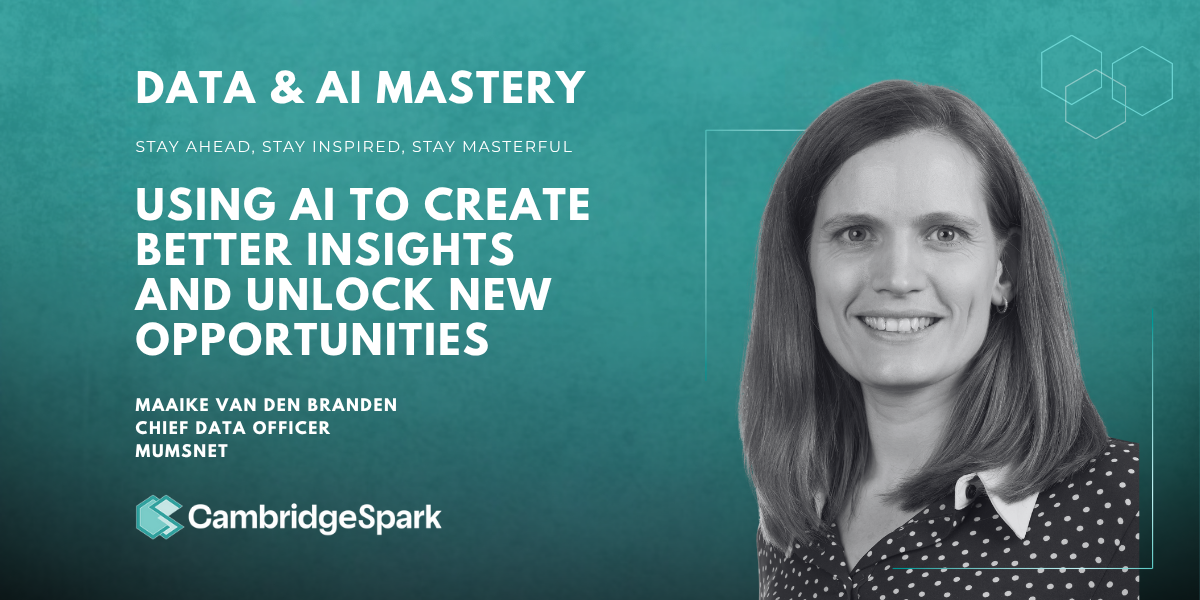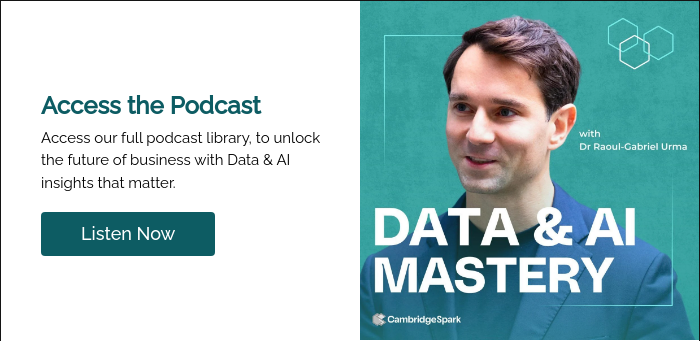AI isn’t just for big players anymore. So, how can you best leverage it, and what does the future of AI look like for small businesses?
AI isn’t just for big players anymore. The reality is you don’t need an enterprise-level budget anymore to use AI to create real impact. So, what does the future of AI look like for small businesses?
In a recent episode of the Data & AI Mastery Podcast, Maaike Van Den Branden, Chief Data Officer (CDO) at Mumsnet, shared some valuable insights on this very topic. Mumsnet, the UK’s largest parenting forum, with over 9 million monthly visitors, has embraced AI to transform its approach to data—and in doing so, has set a powerful example for small businesses.
Let’s explore some key takeaways from their success story.
Identify Specific Challenges AI Can Solve
If you want AI to really benefit your business, you need to first understand why you’re using it. Without a clear purpose, you’re operating blindly. The first step is identifying specific challenges AI can solve.
For Mumsnet, this was a clear need: analysing millions of user conversations to extract valuable insights. Maaike explains,
”Mumsnet is a website that relies very heavily on the platform on the forum part of the website, so there's a lot of data being captured every day. We've got millions of visitors every day, and not every visitor will post, but a lot of visitors read posts. So we have to have a good understanding of how many people come to our site to do what. So if we can't capture that data, we have no idea how the site is going and how it might be going in the future.”
So, the key is to identify a pain point in your business and figure out how AI can make a real difference. It can be automating repetitive tasks, analysing customer feedback, or optimising your marketing campaigns. This is unique to your business.
Leverage Existing AI Tools
With tools like ChatGPT levelling the playing field, it’s become much easier for businesses of all sizes to tap into AI. Mumsnet is a prime example of how small businesses can adopt new technologies to meet their needs. One of Maaike’s key achievements is developing MumsGPT, an AI-powered qualitative research tool that has helped them:
- Extract brand mentions from millions of user conversations
- Analyse user trends with better accuracy
- Create structured data from unstructured text, offering more value for teams and clients
Maaike emphasises that MumsGPT is designed to improve the user experience, not disrupt it. As she explains,
“We don't use AI to post content on the forum. All of our posts are human-generated. We are using AI at the backend to summarise information, and always with the intent of that it benefits the user somehow, whether it's with a brand partnership so that we know the brand knows what our users think and can adapt their product suite to that information or whether it's for a product team to improve the website.”
Foster a Sense of Ownership
This is a crucial lesson not just for AI tools but for data as a whole. When everyone in a team feels responsible for data quality and its outcomes, it creates a culture of ownership and accountability. This ensures that data, including AI-driven insights, is used effectively to drive smarter decisions, innovate, and ultimately achieve better business results. Maaike says,
“Everyone's responsible for the data, for the quality of the data. We, as a data team, don't often generate the data. That gets generated by product teams, by commercial teams, by finance teams and for the data to be right, they need to do a good job of inputting that data or saving that data.”
Essentially, when teams take ownership of the data, including AI initiatives, it leads to more accurate and actionable insights for your business.
Focus on Value, Not Trends
Trends are fleeting, but the fundamentals remain the same. As Maaike emphasises in this episode, don’t fall prey to every new trend. Instead, stick to the basics and always focus on real value and impact.
You don’t have to use every tool out there—just the ones that genuinely make a difference for your business. Maaike says,
“All these buzz things, we always need to think back to basics and find low-hanging fruit and see which things we can actually do to help a business rather than think about all the nice and fluffy things.”
Iterate and Improve
Finally, one key takeaway for AI initiatives and business in general is the importance of course correction. You don’t need a perfect AI solution from day one—what matters is starting small, learning as you go, and improving over time.
Just like Mumsnet did with MumsGPT, begin with something manageable, analyse the results, and refine your approach step by step. And always keep the big picture in mind—real value and impact.
For more insights on how small businesses can successfully integrate AI in the future, be sure to listen to the full episode with Maaike!





